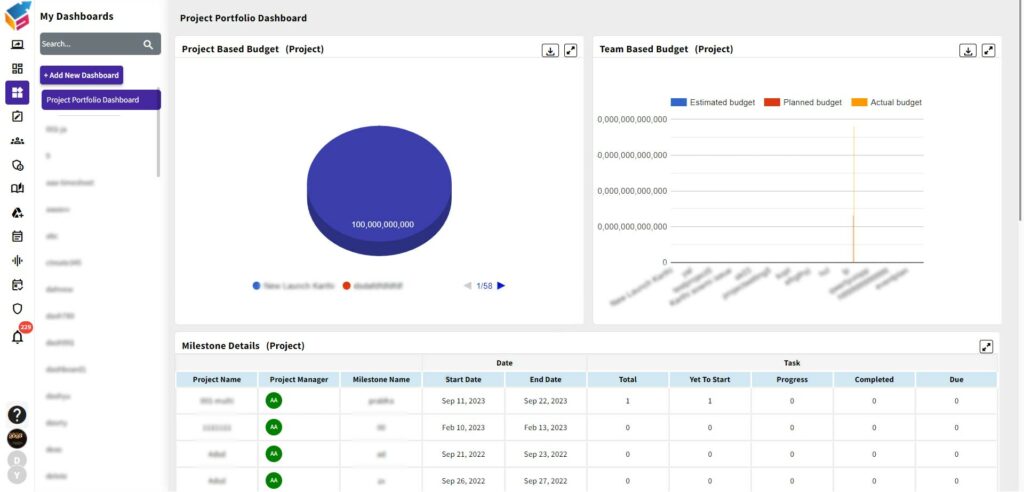Table of Contents
Today’s highly competitive business environment, successful project management has become a critical factor for organizations aiming to stay ahead of the curve. As projects grow in complexity and scope, it is imperative to have a comprehensive understanding of their progress, performance, and overall effectiveness. This is where analytics steps in as a game-changer, providing project managers with the power to make informed decisions, optimize resources, and drive success.
The importance of analytics in project management cannot be overstated. It allows project managers to gather, analyze, and interpret vast amounts of data, enabling them to gain valuable insights into project performance, identify potential risks, and make data-driven decisions.
In this blog post, we will explore five key reasons why analytics plays a crucial role in effective project management, empowering teams to deliver projects on time, within budget, and to the highest quality standards.
From uncovering hidden patterns and trends to enhancing communication and collaboration, the strategic implementation of analytics tools and techniques has proven to be a game-changer in project management. By harnessing the power of data, project managers can optimize their project lifecycle, mitigate risks, and improve overall project outcomes.
So, whether you are a project manager looking to enhance your skills or a newcomer eager to understand the significance of analytics in project management, this blog post will provide you with valuable insights and actionable strategies to leverage analytics effectively.
Let’s delve into the five key reasons why analytics is crucial in project management and discover how it can revolutionize your project management practices.
What are Project Analytics?
Project analytics is about to the use of data and analytical techniques to gain insights into project performance, progress, and outcomes. It involves collecting, analyzing, and interpreting project-related data to understand patterns, trends, and potential risks, enabling project managers to make data-driven decisions and optimize project outcomes.
Project analytics encompasses various aspects of a project, including performance metrics, resource allocation, budget management, risk assessment, and stakeholder engagement. By leveraging project analytics, project managers can assess project health, identify areas of improvement, and take proactive measures to mitigate risks and maximize project success.
Key components of project analytics include:
- Data Collection: Gathering relevant project data from various sources, such as project management software, financial records, resource databases, and stakeholder feedback.
- Data Analysis: Applying analytical techniques and tools to process and analyze the collected data, identifying patterns, trends, correlations, and outliers.
- Performance Metrics: Defining and tracking key performance indicators (KPIs) to measure project progress, efficiency, quality, and adherence to project goals.
- Risk Assessment: Using analytics to identify potential risks, assess their likelihood and impact, and develop risk mitigation strategies.
- Forecasting and Predictive Analytics: Utilizing historical data and predictive models to forecast project outcomes, estimate timelines and resource requirements, and anticipate potential issues.
- Visualization and Reporting: Presenting project data and insights in a visual and easily understandable format through charts, graphs, and reports, facilitating effective communication with stakeholders.
Overall, project analytics provides project managers with valuable insights into project performance, enabling them to make informed decisions, optimize resources, mitigate risks, and drive successful project delivery.
5 Ways Analytics Helps Project Managers
- Data-Driven Decision Making: Analytics empowers project managers to make informed decisions based on data rather than relying on intuition or guesswork. By analyzing project data, such as performance metrics, resource utilization, and risk factors, project managers can identify trends, patterns, and potential issues, enabling them to make proactive decisions that optimize project outcomes.
- Performance Monitoring and Evaluation: Analytics provides project managers with real-time visibility into project performance. By tracking key performance indicators (KPIs) and utilizing analytics tools, project managers can monitor progress, identify bottlenecks, and assess the overall health of the project. This allows them to take corrective actions promptly, ensuring that projects stay on track and meet their objectives.
- Risk Identification and Mitigation: Analyzing project data helps project managers identify potential risks and uncertainties that may impact project success. Through advanced analytics techniques, project managers can assess historical data, identify risk factors, and develop risk mitigation strategies. By proactively addressing risks, project managers can minimize the likelihood of project delays, budget overruns, and quality issues.
- Resource Optimization: Analytics enables project managers to optimize resource allocation and utilization. By analyzing resource data, including availability, skill sets, and workload, project managers can identify resource gaps, allocate resources effectively, and ensure that the right people are assigned to the right tasks. This helps streamline project workflows, maximize resource efficiency, and improve overall productivity.
- Performance Forecasting and Planning: Analytics tools and techniques enable project managers to forecast future project performance based on historical data and trends. By leveraging predictive analytics, project managers can estimate project timelines, budget requirements, and potential risks. This empowers them to develop realistic project plans, set achievable goals, and establish accurate expectations with stakeholders.
Analytics plays a vital role in project management by providing project managers with actionable insights and data-driven decision-making capabilities.
From improving performance monitoring and evaluation to optimizing resource utilization and forecasting project outcomes, analytics equips project managers with the project management tools they need to drive successful project delivery.
By embracing analytics, project managers can navigate complexities, mitigate risks, and ensure project success in today’s dynamic business landscape.
Challenges Leveraging Project Analytics
While project analytics offers numerous benefits, there are also challenges that project managers may encounter when leveraging analytics in their projects. These challenges include:
- Data Quality and Availability: One of the primary challenges is ensuring the quality and availability of data. Project managers rely on accurate and reliable data to generate meaningful insights. However, data may be incomplete, inconsistent, or scattered across multiple systems, making it challenging to obtain a comprehensive view of project performance.
- Data Integration: Integrating data from various sources and systems can be complex and time-consuming. Different tools, platforms, and departments may store data in different formats or use incompatible systems, making it challenging to consolidate and analyze data effectively.
- Data Interpretation and Expertise: Analyzing project data requires specific skills and expertise in data analytics. Project managers may face challenges in interpreting and understanding the insights generated from analytics tools. They need to possess the knowledge and expertise to interpret data accurately and draw actionable conclusions.
- Change Management: Implementing project analytics often requires a cultural shift within the organization. Project managers and team members may need to adopt new processes and technologies, which can encounter resistance and reluctance to change. Effective change management strategies are necessary to overcome this challenge.
- Tool Selection and Implementation: Selecting the right analytics tools and technologies can be overwhelming. Project managers must assess their specific needs, consider the capabilities and limitations of different tools, and ensure seamless integration with existing systems. Additionally, implementing new task management tools may require training and support for project teams to effectively utilize them.
- Data Privacy and Security: Project data often contains sensitive and confidential information. Project managers must address privacy and security concerns, ensuring that data is protected and complies with relevant regulations and internal policies. Implementing robust data privacy and security measures is essential to mitigate potential risks.
- Overcoming Resistance to Analytics: Resistance to adopting analytics-driven decision-making can be a challenge. Some project stakeholders may prefer traditional, intuition-based decision-making methods and may be skeptical of relying solely on data. Project managers need to communicate the benefits of project analytics effectively and build trust in the data-driven approach.
By acknowledging and proactively addressing these challenges, project managers can better leverage project analytics and reap its benefits. It requires a combination of technical expertise, effective change management, and organizational support to overcome these challenges and create a data-driven project management culture.
How Enterprise Project Performance Software Can Help
Here’s how Yoroproject can help with project performance:

- Centralized Project Management: Yoroproject provides a centralized platform where teams can create, manage, and track projects. It offers customizable boards, timelines, and dashboards to visualize project progress and status.
- Task Management: Teams can create tasks, assign owners, set due dates, and prioritize work. This helps in assigning responsibilities and ensuring that everyone is aware of their tasks and deadlines.
- Collaboration: Yoroproject facilitates collaboration by allowing team members to comment, attach files, and communicate within tasks and projects. This ensures that discussions are contextually tied to the work being done.
- Automation: The platform offers automation features that can streamline repetitive tasks and workflows. For example, you can automate task assignments, notifications, and status updates based on certain triggers or conditions.
- Integration: Yoroproject integrates with various third-party tools and applications, including file-sharing platforms, communication tools, and project management apps. This enables teams to connect their existing tools and data to enhance productivity.
- Resource Management: Users can allocate and track resources (human and material) across projects, ensuring that resources are utilized efficiently.
- Performance Analytics: Yoroproject provides reporting and analytics features that allow organizations to assess project performance. Users can create custom reports and dashboards to monitor key performance indicators (KPIs) and make data-driven decisions.
- Scaling and Customization: It’s scalable and adaptable to different team sizes and project complexities. You can customize workflows and boards to match your organization’s specific needs.
- Accessibility: Yoroproject is designed to be accessible from various devices and locations, making it suitable for remote and distributed teams.
- Security: It offers security features to protect sensitive data, including user permissions, authentication, and encryption.




